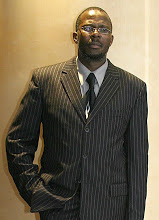Despite the current global economic recession, small and medium enterprises development was pivotal to the new South African government employment plans and it remains central to the country's search for an economic growth trajectory.
These sentiments were echoed by the prominent member of the World Economic Forum, Sandile Zungu, as he outlined his (personal) inputs and insights of what the SME's should be treated under the new South African administration led by President Jacob Zuma.
Zungu,who is also the Chairperson of the multi-diversfied Zungu Investments Company was giving a keynote address during the eThekwini Municipality Business Support and Markets Unit's SMME Breakfast at the Durban International Convention Centre on Wednesday.
"The SMME's are the engine of the South African economic future and it will always come second best in the globalised economic environment.
SMME account for 35% of the country's GDP, and it employs 3.8 million of which 34% of it is located within the informal sector" outlines Zungu
He decried the government of being unsupportive to SMME's in terms of procurement practices, regulations and taxation laws.
"South African regulations are not geared to support SMME's as it requires too much paperwork and most of the small, meduim and emerging enterpreneurs do not have a clue about financial administrative issues.
Why are SMME's made to pay so much tax, was the DTI, Planning Commission or the Department of Economic Development playing the ball to promote the sustainability of the SMME's, he asked.
However, Zungu noted that the new ANC-led administration had promised to make structural changes and, he urged participants, that public commitment was required since the government was even or had made the broad-based Black economic empowerment codes and guidelines simplified.
"Going forward, every SMME must consider the implications of the global financial crisis from the sub-prime crisis to debt crisis.
Globalisation and the myth of decoupling can be seen in the practical example in the automobile sector whereby it was reported that Barclays Bank had declined to bail-out its longterm business partner Dodge because it could not guarantee repayments timeously.
Local banks have begun to emulate international practise, as SMME's that do not have enough money in the bank to put collateral, were already feeling the pinch" said Zungu.
As the economy continues to decline the small, meduim and emerging entepreneur is the most affected but, added Zungu, these challenges create opportunities for real enterpreneurs such as Richard Bronson, the CEO of Virgin Airlines, who had started his business while with other passengers were stranded in Colombia.
"All the agents of the state and big business must come into the party to support SMME development because this sector (SMME) stands to grow beyond a 70% threshold of the country's GDP within the next ten years" mooted Zungu.
Even the Chief Executive Officer of SEDA eThekwini Protas Madlala concurred fully with bottlenecks and red tape experienced by the SMME's and accussed what he termed 'gatekeepers' whose interests are 'what is there for me in SMME development'.
"Capital flight can be seen daily among the township women that have organised themselves into co-operative societies and make school uniforms, yet, they do not get to supply local schools within their local areas or immediate municipalities.
Instead at the beginning of every year we find school principals that cajoles parents to buy the school uniforms from a certain established shops in the city centre.
How do we address this stereotyping of our own small and emerging enterpreneurs by the 'what is in for me' mentality by oour very own leadership? Was this playing any role in the promotion of Black economic empowerment? " asked Madlala
Wednesday, July 8, 2009
Subscribe to:
Comments (Atom)


